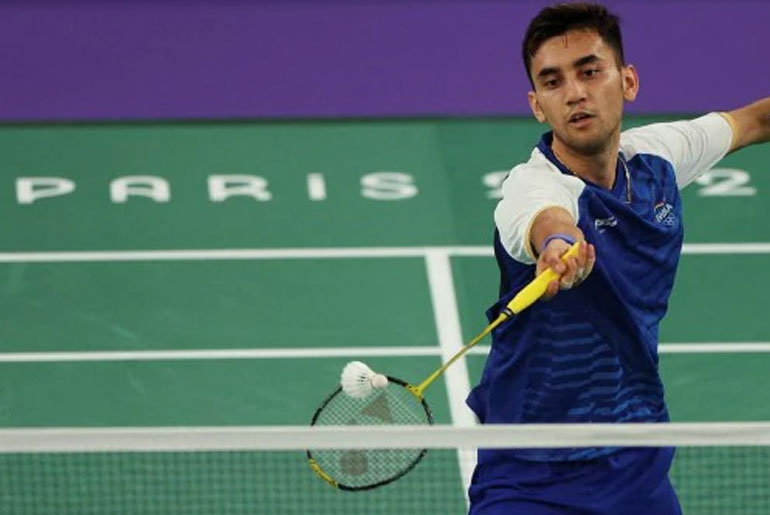Indian badminton star Lakshya Sen has made history by advancing to the semi-finals in his Olympic debut. Although he didn’t secure a silver medal, the 22-year-old is set to compete for bronze today. His remarkable achievement not only highlights his exceptional talent and dedication but also underscores badminton’s growing prominence on the global stage. Lakshya Sen’s journey from a promising young player to an Olympic semi-finalist serves as an inspiring example for aspiring athletes in India and beyond.
Lakshya Sen’s success is captivating audiences worldwide and brings attention to the broader benefits of playing badminton. Often seen as a casual backyard pastime, badminton is actually a highly beneficial sport for enhancing overall health and well-being.
Chetendra Pratap Singh, district physical education officer in Firozabad, Uttar Pradesh, emphasizes the sport’s numerous advantages for both the body and mind. Singh points out that badminton’s high-intensity movements—such as lunging, jumping, diving, and sprinting—elevate the heart rate, improving cardiovascular efficiency and muscle strength. Regular play can significantly boost VO2 max, a key indicator of cardiovascular fitness.
Moreover, badminton is an excellent calorie burner, with vigorous games capable of burning up to 450 calories per hour. This makes it an effective way to manage weight and maintain a healthy body composition. By strengthening the heart, improving blood circulation, and reducing the risk of cardiovascular diseases, badminton proves to be a valuable exercise for overall health.
Comprehensive Benefits of Badminton
- Cardiovascular Health
Badminton is an excellent cardiovascular workout that involves rapid movements such as lunging, jumping, diving, and sprinting. These actions elevate the heart rate, which enhances heart efficiency and muscle strength. Research indicates that regular badminton play can significantly boost VO2 max, a critical measure of cardiovascular fitness. By strengthening the heart and improving its function, badminton helps reduce the risk of heart disease, stroke, and high blood pressure. Additionally, it promotes healthy cholesterol levels and enhances blood circulation. A vigorous game of badminton can burn up to 450 calories per hour, aiding in weight management and supporting a healthy body composition.
- Agility and Coordination
The fast-paced nature of badminton demands quick reflexes, agile footwork, and precise hand-eye coordination. Singh highlights that these skills are not only beneficial on the court but also in various other activities. The constant directional changes and explosive movements involved in badminton train the body to react swiftly and efficiently. This heightened agility can improve performance in other sports and daily tasks. The sport’s emphasis on accuracy and coordination sharpens reflexes and fine motor skills, which can benefit activities like playing musical instruments or typing. Furthermore, maintaining balance during movements enhances core strength and stability, reducing the risk of falls and injuries in daily life.
- Mental Well-Being
Playing badminton triggers the release of endorphins, natural mood enhancers that act as stress relievers. The concentration required during a game helps clear the mind and provides a distraction from everyday worries. Regular participation in badminton can improve mood and lower the risk of depression and anxiety. The sense of accomplishment and social interaction associated with the sport further boosts emotional well-being. Additionally, the strategic thinking and quick decision-making involved in badminton can enhance cognitive functions, memory, and concentration. Studies suggest that regular physical activity, including badminton, can promote the growth of new brain cells.
Age-Specific Considerations
Badminton is a versatile sport suitable for all ages and fitness levels. For children and adolescents, it offers a fun way to develop motor skills, coordination, and social abilities. As they grow, the intensity and complexity of drills can be gradually increased. Adults can use badminton to stay active, improve cardiovascular health, and manage weight, with the added benefit of social interaction if they join clubs or leagues. Older adults can benefit from badminton by improving balance, flexibility, and cognitive function. Starting with low-intensity play and gradually increasing activity levels can help maintain fitness and support healthy aging.
Lakshya Sen’s historic achievement at the Olympics underscores not only his exceptional talent but also the broader health benefits of badminton. This sport, often viewed as a casual activity, proves to be a powerful tool for enhancing cardiovascular health, agility, coordination, and mental well-being. From its capacity to burn calories and improve heart efficiency to its impact on reflexes, balance, and emotional health, badminton offers comprehensive benefits for individuals of all ages. Whether for children, adults, or older adults, incorporating badminton into one’s lifestyle can lead to significant improvements in overall fitness and well-being, making it a valuable and enjoyable form of exercise.
Disclaimer:
The information contained in this article is for educational and informational purposes only and is not intended as a health advice. We would ask you to consult a qualified professional or medical expert to gain additional knowledge before you choose to consume any product or perform any exercise.






